The Deeper Thinking Podcast
The Deeper Thinking Podcast The Deeper Thinking Podcast offers a space where philosophy becomes a way of engaging more fully and deliberately with the world. Each episode explores enduring and emerging ideas that deepen how we live, think, and act. We follow the spirit of those who see the pursuit of wisdom as a lifelong project of becoming more human, more awake, and more responsible. We ask how attention, meaning, and agency might be reclaimed in an age that often scatters them. Drawing on insights stretching across centuries, we explore how time, purpose, and thoughtfulness can quietly transform daily existence. The Deeper Thinking Podcast examines psychology, technology, and philosophy as unseen forces shaping how we think, feel, and choose, often beyond our awareness. It creates a space where big questions are lived with—where ideas are not commodities, but companions on the path. Each episode invites you into a slower, deeper way of being. Join us as we move beyond the noise, beyond the surface, and into the depth, into the quiet, and into the possibilities awakened by deeper thinking.
Episodes
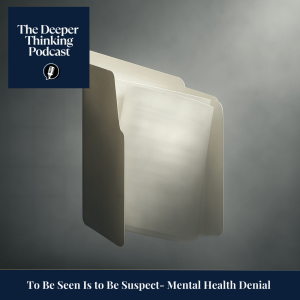
Wednesday Apr 16, 2025
Wednesday Apr 16, 2025
To Be Seen Is to Be Suspect
The Deeper Thinking Podcast
A meditation on diagnosis, distress, and the politics of visibility.
What happens when care becomes a performance, and diagnosis the only form of public belief? This episode explores how mental health recognition is tethered to systems that demand collapse before offering aid. It asks what’s at stake when distress must be translated into medical language just to be acknowledged—and what gets lost when structural grief is mislabeled as clinical excess.
The notion of “overdiagnosis” seems, at first, like a caution against excess. But in a world where suffering is often unseen unless it is named in clinical terms, the real issue may not be inflation—but compression. As Susan McPherson and Lauren Berlant suggest, what we frame as psychiatric surplus may instead be the slow surfacing of deferred, systemic pain. And Judith Butler’s concept of grievability reminds us that some lives—and some pains—are never granted the same access to recognition.
The question, then, is not whether we name too much—but why naming is required at all. Drawing from Frantz Fanon’s insight into translation under power, and Achille Mbembe’s theory of necropolitics, we examine how welfare systems discipline visibility and control affective legitimacy. This episode does not reject diagnosis—it reframes it. Not as falsehood, but as a narrow vessel overflowing with meanings it was never built to hold.
Reflections
Some of the questions that surfaced along the way:
Why must pain be pathologised before it is believed?
What happens when diagnosis becomes a form of access?
Can suffering exist without a medical translation?
Who decides which grief is visible and which is dismissed?
What if “overdiagnosis” is not an excess—but a backlog?
How do systems of care convert witnessing into suspicion?
Is it possible to hold suffering without naming it?
Why Listen?
Explore the ethical politics of diagnosis and visibility
Reframe overdiagnosis through structural and philosophical critique
Engage thinkers who challenge the logic of psychiatric containment
Reflect on recognition, care, and the power of naming
Listen On:
YouTube
Spotify
Apple Podcasts
Support This Work
If you'd like to support the ongoing work, you can visit buymeacoffee.com/thedeeperthinkingpodcast or leave a kind review on Apple Podcasts.
Bibliography
Ahmed, Sara. Living a Feminist Life. Durham: Duke University Press, 2017.
Berlant, Lauren. Cruel Optimism. Durham: Duke University Press, 2011.
Butler, Judith. Precarious Life. London: Verso, 2004.
Fanon, Frantz. Black Skin, White Masks. New York: Grove Press, 2008.
Mbembe, Achille. Necropolitics. Durham: Duke University Press, 2019.
McPherson, Susan. “Challenging the ‘Disorder’ in Mental Health.” Journal of Mental Health, vol. 28, no. 1 (2019): 1–3.
Federici, Silvia. Re-enchanting the World. Oakland: PM Press, 2018.
Foucault, Michel. The Birth of the Clinic. New York: Vintage, 1994.
Kittay, Eva Feder. Love’s Labor. New York: Routledge, 1999.
Honneth, Axel. The Struggle for Recognition. Cambridge: MIT Press, 1995.
Spivak, Gayatri Chakravorty. “Can the Subaltern Speak?” In Marxism and the Interpretation of Culture, University of Illinois Press, 1988.
Rancière, Jacques. The Politics of Aesthetics. London: Bloomsbury, 2013.
Sharpe, Christina. In the Wake. Durham: Duke University Press, 2016.
Anzaldúa, Gloria. Borderlands/La Frontera. San Francisco: Aunt Lute, 1987.
Bloch, Ernst. The Principle of Hope. Cambridge: MIT Press, 1995.
Lugones, María. Pilgrimages/Peregrinajes. Lanham: Rowman & Littlefield, 2003.
To be named is not always to be known. And to be seen is not always to be safe.
#MentalHealth #Overdiagnosis #JudithButler #LaurenBerlant #SusanMcPherson #FrantzFanon #AchilleMbembe #Recognition #Visibility #StructuralGrief #TheDeeperThinkingPodcast #Suffering #PoliticsOfCare #AffectTheory
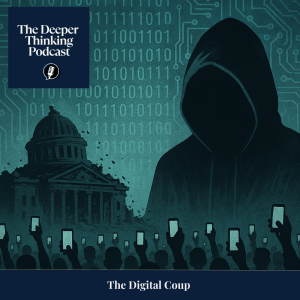
Tuesday Apr 15, 2025
Tuesday Apr 15, 2025
The Digital Coup
The Deeper Thinking Podcast
For those tracing silence not as absence—but as structure.
What does it mean to witness a coup without tanks, to live inside a regime of silence engineered through code? In this extended episode, we examine Carole Cadwalladr’s TED2024 talk—where she returns not as a journalist, but as a trace. Her story unfolds at the intersection of platform power, legal suppression, and algorithmic simulation. The digital coup has already happened, and she names it.
Cadwalladr reveals a world in which the infrastructure of freedom has been quietly overwritten—where data replaces consent, and AI echoes voices it was never given permission to learn. With the rise of the broligarchy—a transnational class of platform-aligned sovereigns—journalistic dissent is punished not by censors, but by courts, algorithms, and silence. Through Cadwalladr’s refusal, we ask: can memory survive simulation? Can refusal still constitute design?
We explore how law, language, and architecture fuse to erase dissent before it’s heard. Drawing on Sylvia Wynter, Jean-Luc Nancy, and Judith Butler, we frame naming not as performance, but as political ontology. This is not a collapse—it’s a recursion. And in that recursion, resistance is not erased. It is revoiced.
Why Listen?
Understand the legal and infrastructural mechanics of a digital coup
Explore how epistemic justice is weaponised and reconstituted under AI
Engage philosophers like Nancy, Spivak, Butler, and Mbembe alongside Cadwalladr’s lived experience
Trace refusal not as retreat, but as post-erasure authorship
Listen On:
YouTube
Spotify
Apple Podcasts
Support This Work
If you'd like to support the ongoing work, you can visit buymeacoffee.com/thedeeperthinkingpodcast or leave a kind review on Apple Podcasts.
Bibliography
Cadwalladr, Carole. “This Is What a Digital Coup Looks Like.” TED Talk, 2024.
The Age of Surveillance Capitalism – Shoshana Zuboff: Data as sovereignty and commercial memory.
Discipline and Punish – Michel Foucault: Visibility as the instrument of modern power.
Being Singular Plural – Jean-Luc Nancy: The relational basis of ontology and community.
Precarious Life – Judith Butler: Mourning, visibility, and grievability as political states.
Necropolitics – Achille Mbembe: Governance through the power to make die and let live.
Can the Subaltern Speak? – Gayatri Spivak: Voice, absence, and the politics of speaking for.
Unsettling the Coloniality of Being – Sylvia Wynter: Epistemic shifts in the human-as-category.
Race After Technology – Ruha Benjamin: The coded racial logics of algorithmic design.
Atlas of AI – Kate Crawford: Political and planetary infrastructures of AI power.
Bibliography Relevance
Carole Cadwalladr: Provides the case study and structural critique anchoring the episode’s themes.
Shoshana Zuboff: Frames surveillance capitalism as the new terrain of digital sovereignty.
Michel Foucault: Offers insight into how architectures of power shape consent, compliance, and visibility.
Jean-Luc Nancy: Illuminates the relational ethics that persist beneath enforced silence.
Judith Butler: Articulates the ontological politics of being seen and allowed to grieve publicly.
Achille Mbembe: Positions the state and platform as necropolitical forces that dictate the terms of presence.
Gayatri Spivak: Examines who is allowed to speak, and what gets lost in mediated representation.
Sylvia Wynter: Reorients the category of the human away from colonial epistemology toward radical plurality.
Ruha Benjamin: Explores algorithmic design as a continuation of racialized systems of control.
Kate Crawford: Exposes the material, environmental, and political cost of AI infrastructures.
Refusal is not the end of authorship—it is its echo, returned from erasure.
#DigitalCoup #CaroleCadwalladr #SurveillanceCapitalism #SylviaWynter #JudithButler #JeanLucNancy #GayatriSpivak #PlatformPower #Refusal #AlgorithmicSilence #TheDeeperThinkingPodcast
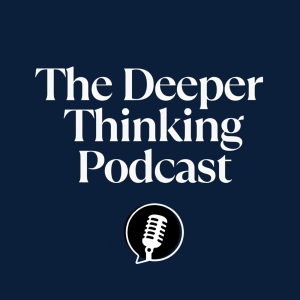
Monday Apr 14, 2025
Monday Apr 14, 2025
The Divergent Mind: Reframing ADHD
The Deeper Thinking Podcast
For those who have never quite fit the frame—and those learning to honor that as a form of knowing.
What if ADHD isn’t a disorder, but a divergent pattern of attention shaped by relational intelligence, rhythmic perception, and ethical sensitivity? In this extended episode, we reimagine ADHD not as a clinical failure but as a philosophical lens—one that refracts the pace, priorities, and punitive designs of the dominant world.
Rather than seeing ADHD as an attention deficit, we explore it as a time-based difference. Russell Barkley frames it as a struggle with internal time management. Gabor Maté connects it to relational wounding. We bring in Bessel van der Kolk and Stephen Porges on trauma and the polyvagal system, and Bonnie Badenoch and Pat Ogden on somatic processing and regulation.
From Devon Price’s critique of productivity myths to Tricia Hersey’s rest-based justice, and Saidiya Hartman’s notion of errant movement, we reflect on how refusal, stillness, and shame alchemize into new maps of self. Lauren Berlant and Silvia Federici remind us that bodies out of sync with capital are not broken—they’re prophetic.
This is not a diagnostic guide. It’s a meditation on rhythm, relationality, and redesigning our worlds to honor minds that don’t flatten to fit. It asks not “How do we fix ADHD?” but “What might a society look like if it made room for it?”
Reflections
Some of the questions that surfaced along the way:
What if hyperactivity is a form of embodied intelligence, not dysfunction?
What does it mean to be “on time” in a culture that ignores relational pace?
Why are minds that resist linearity framed as deviant, rather than deep?
Can shame be unlearned not through correction, but through co-regulation?
How do we reconfigure environments—not people—to support neurodivergence?
When the body leads, what does learning become?
What would it mean to honor emotional sequencing as intelligence?
Why Listen?
Reimagine ADHD through somatic, philosophical, and trauma-informed lenses
Explore rhythm, relational presence, and emotional regulation as intelligence
Learn from voices at the intersection of neuroscience, justice, and embodiment
Move beyond symptom to soul—rethinking design, depth, and dignity
Listen On:
YouTube
Spotify
Apple Podcasts
Support This Work
If you'd like to support the ongoing work, you can visit buymeacoffee.com/thedeeperthinkingpodcast or leave a kind review on Apple Podcasts.
Bibliography
Maté, Gabor. Scattered Minds. New York: Avery, 2023.
van der Kolk, Bessel. The Body Keeps the Score. New York: Penguin, 2014.
Hersey, Tricia. Rest Is Resistance. New York: Little, Brown, 2022.
Price, Devon. Laziness Does Not Exist. New York: Atria Books, 2021.
Badenoch, Bonnie. The Heart of Trauma. New York: Norton, 2017.
Federici, Silvia. Caliban and the Witch. New York: Autonomedia, 2004.
Berlant, Lauren. Cruel Optimism. Durham: Duke University Press, 2011.
Ogden, Pat. Sensorimotor Psychotherapy. New York: Norton, 2006.
Porges, Stephen. The Pocket Guide to the Polyvagal Theory. New York: Norton, 2017.
Hartman, Saidiya. Wayward Lives, Beautiful Experiments. New York: Norton, 2019.
Bibliography Relevance
Gabor Maté: Reframes ADHD as a relational and developmental response rather than a disorder.
Bessel van der Kolk: Explores how trauma is held in the body, informing a somatic approach to attention and regulation.
Tricia Hersey: Positions rest as a radical, justice-driven reorientation to productivity and worth.
Devon Price: Challenges internalized productivity myths and reframes laziness as resistance.
Bonnie Badenoch: Provides a deeply relational, right-hemisphere-informed view of trauma integration.
Silvia Federici: Contextualizes attention and regulation within broader histories of discipline and extraction.
Lauren Berlant: Examines the affective structures that shape how we endure and interpret chronic overwhelm.
Pat Ogden: Introduces sensorimotor techniques for engaging with trauma held below verbal awareness.
Stephen Porges: Offers polyvagal theory as a physiological framework for safety, attention, and co-regulation.
Saidiya Hartman: Illuminates how errant forms of life resist normative containment and redefine relational space.
To be divergent is not to be broken. It is to be carrying a rhythm the world has yet to hear.
#ADHD #Neurodiversity #GaborMaté #StephenPorges #TriciaHersey #SomaticPsychology #Attention #Listening #SilviaFederici #LaurenBerlant #BesselVanDerKolk #DevonPrice #TheDeeperThinkingPodcast #Rest #Rhythm #Embodiment
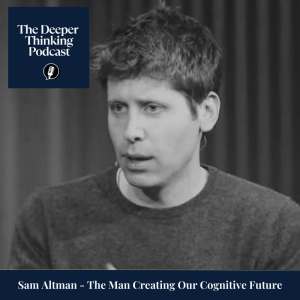
Sunday Apr 13, 2025
Sunday Apr 13, 2025
Sam Altman - The Man Creating Our Cognitive Future
The Deeper Thinking Podcast
What happens when machines stop waiting for input and begin to anticipate you? In this episode, we unpack Sam Altman’s TED2025 conversation with TED curator Chris Anderson—not to debate AI’s dangers or promises, but to trace what it reveals about authorship, memory, agency, and power. This is not just about a future we are building. It’s about a system we’re already inside.
AI is no longer framed as tool, but as presence. A memory that accumulates. A voice that preempts. As Bernard Stiegler wrote, technics are not just extensions of the body—they are prosthetics of memory. And in this episode, memory becomes infrastructure. Through Altman’s calm precision, we hear not certainty but recursion—echoes of Simone Weil’s claim that attention is an act of devotion, and Hannah Arendt’s insistence that every birth is a beginning of a new world, whether we intend it or not.
The episode also surfaces contradictions between openness and control, ambient design and algorithmic authorship. As Byung-Chul Han warns, transparency can flatten trust into performance. And Gloria Anzaldúa reminds us that contradiction is not a flaw—it is the texture of reality. This episode listens for the textures Altman doesn’t name, but performs: recursion, proximity, the ambient structure of systems that speak before we do.
Why Listen?
Explore AI as atmosphere, not interface
Understand how memory, trust, and agency are being restructured
Hear Altman’s own words—with quote fidelity—against deep theory
Engage thinkers from Weil to Moten, Virilio to Simondon
Listen On:
YouTube
Spotify
Apple Podcasts
Support This Work
If you'd like to support the ongoing work, you can visit buymeacoffee.com/thedeeperthinkingpodcast or leave a kind review on Apple Podcasts.
What We Learned Along the Way
Bernard Stiegler: Frames technics as memory prosthetics—technologies that rewire cognition through time.
Simone Weil: Understands attention as sacred discipline and moral action, relevant to AI’s pre-emptive design.
Hannah Arendt: Offers a politics of beginning that disrupts deterministic views of technological evolution.
Byung-Chul Han: Critiques transparency as a neoliberal control logic cloaked in openness.
Gloria Anzaldúa: Validates contradiction as epistemology—central to understanding algorithmic paradox.
Fred Moten: Writes from the break—where performance, refusal, and improvisation co-author meaning.
Paul Virilio: Defines speed as political vector—accelerated systems and compressed agency.
Gilbert Simondon: Reconceives individuation and the technical object as co-emergent, not separate.
Roland Barthes: Questions authorship—relevant to Altman’s ambiguous role in shaping language models.
Sheila Jasanoff: Introduces “technologies of humility” as a framework for responsible AI governance.
The system is already speaking. The question is—who taught it to listen like that?
#SamAltman #AI #BernardStiegler #SimoneWeil #HannahArendt #ByungChulHan #FredMoten #PaulVirilio #GloriaAnzaldúa #GilbertSimondon #TheDeeperThinkingPodcast #Authorship #Trust #Futurity #Memory #Prosthetics #AmbientAI
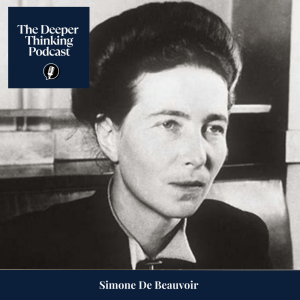
Saturday Apr 12, 2025
Saturday Apr 12, 2025
Becoming in a World Already Made
The Deeper Thinking Podcast
This episode traces the life and philosophy of Simone de Beauvoir, whose thought remains a discipline of staying with contradiction. We explore how her theory of gender as a process of becoming disrupts essentialist myths, how ambiguity becomes an ethical commitment, and why lived experience—its difficulty, its dailiness—must remain central to any philosophy that hopes to mean something. This is not an essay about clarity, but about holding pressure: between freedom and limit, subject and other, intimacy and asymmetry.
We follow Beauvoir’s dismantling of the eternal feminine, her critique of woman as the constructed Other, and her insistence—via her own life and writing—that philosophy must begin from within the unresolved. Drawing lines through the work of thinkers like Sara Ahmed and Gloria Anzaldúa, we examine how Beauvoir’s legacy isn’t purity or conclusion—but a recursive method of attention. A refusal to resolve what is still becoming.
There is no clean end to Beauvoir’s thought. Instead, it loops, doubles back, and insists that we reenter the field of questions we hoped to escape. To listen is to stay close to tension, to contradiction, and to the possibility that becoming isn’t a path—but a structure we continue to live inside.
Why Listen?
Explore Beauvoir’s five key theories with philosophical and narrative depth
Understand why ambiguity, not certainty, was her ethical starting point
See how freedom must be lived within limits, not outside them
Reframe philosophy as rooted in experience—not escape from it
Further Reading
As an affiliate, we may earn from qualifying purchases through these links.
The Second Sex by Simone de Beauvoir — A foundational critique of woman as Other and the myth of femininity. Amazon link
The Ethics of Ambiguity by Simone de Beauvoir — On freedom, ambiguity, and responsibility in existential life. Amazon link
Living a Feminist Life by Sara Ahmed — On orientation, institutional memory, and inherited structure. Amazon link
Borderlands/La Frontera by Gloria Anzaldúa — A landmark on identity, hybridity, and epistemic dissonance. Amazon link
Listen On:
YouTube
Spotify
Apple Podcasts
Bibliography
Beauvoir, Simone de. The Second Sex. Translated by Constance Borde and Sheila Malovany-Chevallier. New York: Vintage Books, 2011.Beauvoir, Simone de. The Ethics of Ambiguity. Translated by Bernard Frechtman. New York: Citadel Press, 1976.Ahmed, Sara. Living a Feminist Life. Durham: Duke University Press, 2017.Anzaldúa, Gloria. Borderlands/La Frontera: The New Mestiza. San Francisco: Aunt Lute Books, 1987.Simons, Margaret A. Beauvoir and the Second Sex: Feminism, Race, and the Origins of Existentialism. Lanham: Rowman & Littlefield, 1999.Moi, Toril. Simone de Beauvoir: The Making of an Intellectual Woman. Oxford: Blackwell, 1994.
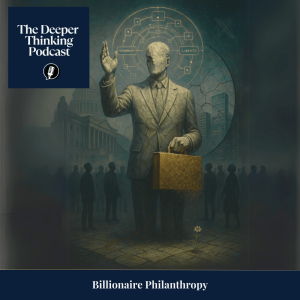
Friday Apr 11, 2025
Friday Apr 11, 2025
Billionaire Philanthropy The Deeper Thinking Podcast
As the myth of the heroic billionaire begins to unravel, we are left with a haunting question: what happens when capital becomes culture, and wealth is mistaken for wisdom? This episode examines the slow collapse of the savior narrative—the notion that individuals of great wealth are uniquely positioned to govern, to fix, or to redeem what democratic systems cannot. What emerges in its place is not a vacuum, but a reckoning. Not a villain, but a failure of structure.
Drawing on thinkers like Max Weber, Michel Foucault, and Wendy Brown, we explore how bureaucracy, surveillance, and soft power reconfigure governance in the image of wealth. We ask how philanthropy functions not as remedy but as choreography—what Lauren Berlant might call a form of cruel optimism—and how the promise of innovation often conceals the architecture of control. The episode then moves through the frameworks of Amartya Sen and Achille Mbembe to ask what justice and power might look like when redistributed, not concentrated.
This is not a story of villains. It is a story of illusions. And the work of truth, as ever, is architectural. What we need is not a new hero, but a scaffold. Something built for many hands. Something that lasts.
Why Listen?
The cultural anatomy of the billionaire myth
How philanthropy reinforces structural inequality
Why spectacle replaces governance in neoliberal democracy
What justice looks like when designed, not donated
Further Reading
As an affiliate, we may earn from qualifying purchases through these links.
The Protestant Ethic and the Spirit of Capitalism by Max Weber — The link between economic life and moral legitimacy. Amazon link
Discipline and Punish by Michel Foucault — Surveillance, normalization, and power. Amazon link
Development as Freedom by Amartya Sen — Human capability and economic justice. Amazon link
Listen On:
YouTube
Spotify
Apple Podcasts
Further Reading
Berlant, Lauren. 2011. Cruel Optimism. Durham, NC: Duke University Press.
Brown, Wendy. 2015. Undoing the Demos: Neoliberalism's Stealth Revolution. Brooklyn, NY: Zone Books.
Foucault, Michel. 1995. Discipline and Punish: The Birth of the Prison. Translated by Alan Sheridan. New York: Vintage Books. Originally published 1975.
Mbembe, Achille. 2019. Necropolitics. Translated by Steven Corcoran. Durham, NC: Duke University Press.
Sen, Amartya. 1999. Development as Freedom. New York: Alfred A. Knopf.
Weber, Max. 2002. The Protestant Ethic and the Spirit of Capitalism. Translated by Stephen Kalberg. Los Angeles: Roxbury Publishing Company. Originally published 1905.
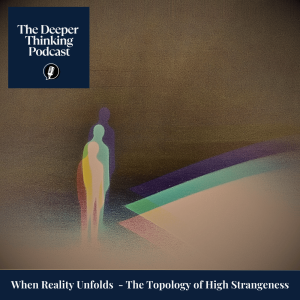
Friday Apr 11, 2025
Friday Apr 11, 2025
When Reality Unfolds: The Topology of High Strangeness
The Deeper Thinking Podcast
Witnesses rarely remember high strangeness as terror. What unfolds is quieter—stranger. The silhouette is voided. The body stays calm. The event resists narrative. And in its place, the real begins to shift. This episode follows the emergence of two encounters—a figure by the hedge, and another in a kitchen—and explores what happens when the world fails to hold its shape.
Working through the six-layer model by Jacques Vallée and Eric Davis, we examine the phenomenon across physical, psychological, cultural, and informational layers. Rather than offering closure, the model reveals what kind of perception is needed to endure the unresolvable. It is not an invitation to belief, but an architecture for remaining—when explanation fails, and yet something real has occurred.
What does it mean to register an anomaly without grasping for meaning? What if attention itself becomes part of the event? Drawing on ideas from Gloria Anzaldúa, Karen Barad, and Jungian archetype theory, this episode explores not what is seen, but how seeing gets rewritten. The anomaly is not an object—it is a fold. And the fold does not close.
Why Listen?
Learn the six-layer model of high strangeness from Vallée and Davis
Explore epistemic rupture through story, not theory
Engage concepts from Anzaldúa, Barad, and Jung without abstraction
Further Reading
As an affiliate, we may earn from qualifying purchases through these links.
Passport to Magonia by Jacques Vallée — Case histories of strange phenomena with cross-cultural pattern recognition. Amazon link
Borderlands/La Frontera by Gloria Anzaldúa — Identity and knowledge at the edge of structure. Amazon link
Meeting the Universe Halfway by Karen Barad — Ontology, agency, and quantum entanglement. Amazon link
Listen On:
YouTube
Spotify
Apple Podcasts
Bibliography
Anzaldúa, Gloria. Borderlands/La Frontera: The New Mestiza. 4th ed. San Francisco: Aunt Lute Books, 2012.
Barad, Karen. Meeting the Universe Halfway: Quantum Physics and the Entanglement of Matter and Meaning. Durham, NC: Duke University Press, 2007.
Davis, Eric W., and Jacques Vallée. "Incommensurability, Orthodoxy and the Physics of High Strangeness: A 6-layer Model for Anomalous Phenomena." National Institute for Discovery Science, 2003.
Jung, C. G. The Archetypes and the Collective Unconscious. 2nd ed. Translated by R.F.C. Hull. Princeton, NJ: Princeton University Press, 1981.
Vallée, Jacques. Passport to Magonia: From Folklore to Flying Saucers. Charlottesville, VA: Anomalist Books, 2014.
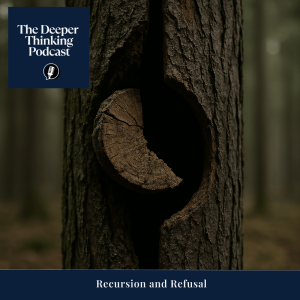
Thursday Apr 10, 2025
Thursday Apr 10, 2025
Recursion and Refusal The Deeper Thinking Podcast
We live in systems that cannot hesitate. Algorithms forecast behavior before it forms. Ecosystems are modeled for collapse before the signs appear. And the pace of prediction erodes our capacity to pause, reflect, and remain. But this is not just a crisis of speed — it is a crisis of thought. What happens when memory becomes prediction, and presence becomes noise?
This episode moves between ecological logic and algorithmic control, asking not for answers but for attention. What does it mean to model a forest as data? Or to treat silence as an error? With insights drawn from Martin Heidegger, Gregory Bateson, Bernard Stiegler, Hannah Arendt, Gilbert Simondon, Henri Bergson, Jacques Derrida, Michel Foucault, and Walter Benjamin, we explore the structures we trust, the models we mistake for reality, and the silences that still refuse to be simulated.
Why Listen?
Heidegger’s “withdrawal” as the root of epistemic blindness
Bateson’s “pattern which connects” and its unmodelable logic
Stiegler’s recursive memory and the automation of care
Arendt’s silence as a moral structure in judgment
Simondon’s individuation vs algorithmic state logic
Bergson’s duration as resistance to compression
Derrida’s rupture as structural—not accidental
Foucault’s biopower in predictive systems
Benjamin’s messianic suspension as exit logic
Further Reading
As an affiliate, we may earn from qualifying purchases through these links.
Being and Time by Martin Heidegger — Ontological withdrawal and the structure of appearing. Amazon link
Steps to an Ecology of Mind by Gregory Bateson — Systems thinking and recursive pattern. Amazon link
Technics and Time, 1 by Bernard Stiegler — Memory, technology, and the future. Amazon link
Listen On:
YouTube
Spotify
Apple Podcasts
Biliography
Arendt, Hannah. The Life of the Mind. New York: Harcourt, 1978.
Bateson, Gregory. Steps to an Ecology of Mind: Collected Essays in Anthropology, Psychiatry, Evolution, and Epistemology. Chicago: University of Chicago Press, 2000.
Benjamin, Walter. Illuminations. Edited by Hannah Arendt. Translated by Harry Zohn. New York: Schocken Books, 1968.
Bergson, Henri. Time and Free Will: An Essay on the Immediate Data of Consciousness. Translated by F. L. Pogson. New York: Dover Publications, 2001.
Derrida, Jacques. Writing and Difference. Translated by Alan Bass. Chicago: University of Chicago Press, 1978.
Foucault, Michel. The Birth of Biopolitics: Lectures at the Collège de France, 1978–1979. Translated by Graham Burchell. New York: Palgrave Macmillan, 2008.
Heidegger, Martin. Being and Time. Translated by John Macquarrie and Edward Robinson. New York: Harper & Row, 1962.
Simondon, Gilbert. Individuation in Light of Notions of Form and Information. Translated by Taylor Adkins. Minneapolis: University of Minnesota Press, 2020.
Stiegler, Bernard. Technics and Time, 1: The Fault of Epimetheus. Translated by Richard Beardsworth and George Collins. Stanford: Stanford University Press, 1998.
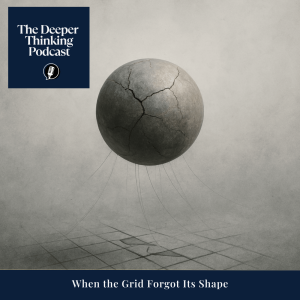
Thursday Apr 10, 2025
Thursday Apr 10, 2025
When the Grid Forgot Its Shape The Deeper Thinking Podcast
In 2024, hedge fund founder Ray Dalio warned the World Economic Forum that the global financial system was not merely bending under pressure—it was entering terminal breakdown. He spoke not of corrections or cycles, but of convergence: debt saturation, geopolitical entropy, technological enclosure, and the slow hollowing of democratic form. We don’t usually begin essays with billionaires. But this time, the language of collapse came not from poets or prophets—but from inside the algorithm.
This episode is a meditation on the long emergency. Not just economic unraveling, but epistemic and ontological dislocation. We move from Arrighi’s theory of financial hegemonies to Arendt’s loneliness and totalitarian drift. From Schmitt’s sovereign exception to Baudrillard’s simulation of markets. The logic of order is unraveling—replaced not by chaos, but by recursive contradiction: climate as sovereign, AI as architecture, debt as metaphysics. The old world is dying. The new world cannot yet be born. Now is the time of monsters.
Why Listen?
Understand the structural recursion behind systemic breakdown
Explore how thinkers like Arrighi, Arendt, Schmitt, and Baudrillard explain political and financial entropy
Engage with the idea of collapse not as catastrophe, but as recursion
Learn how motifs of monstrosity, opacity, and exhaustion define this moment
Further Reading
As an affiliate, we may earn from qualifying purchases through these links.
The Long Twentieth Century by Giovanni Arrighi — Financial cycles, hegemonic rise and fall. Amazon link
The Origins of Totalitarianism by Hannah Arendt — Power, loneliness, and structural violence. Amazon link
Simulacra and Simulation by Jean Baudrillard — Reality collapse and economic illusion. Amazon link
Listen On:
YouTube
Spotify
Apple Podcasts
Bibliography
Arrighi, Giovanni. The Long Twentieth Century: Money, Power and the Origins of Our Times. London: Verso, 1994.
Arendt, Hannah. The Origins of Totalitarianism. New York: Harcourt, Brace, 1951.
Baudrillard, Jean. Simulacra and Simulation. Translated by Sheila Faria Glaser. Ann Arbor: University of Michigan Press, 1994.
Gramsci, Antonio. Selections from the Prison Notebooks. Edited and translated by Quintin Hoare and Geoffrey Nowell Smith. New York: International Publishers, 1971.
Lazzarato, Maurizio. The Making of the Indebted Man: An Essay on the Neoliberal Condition. Translated by Joshua David Jordan. Los Angeles: Semiotext(e), 2012.
Mbembe, Achille. “Necropolitics.” Public Culture 15, no. 1 (2003): 11–40.
Morton, Timothy. Hyperobjects: Philosophy and Ecology after the End of the World. Minneapolis: University of Minnesota Press, 2013.
Schmitt, Carl. Political Theology: Four Chapters on the Concept of Sovereignty. Translated by George Schwab. Chicago: University of Chicago Press, 2005.
Zuboff, Shoshana. The Age of Surveillance Capitalism: The Fight for a Human Future at the New Frontier of Power. New York: PublicAffairs, 2019.
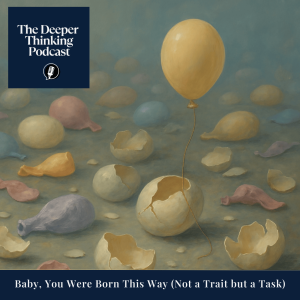
Wednesday Apr 09, 2025
Wednesday Apr 09, 2025
Baby, You Were Born This Way (Not a Trait but a Task)
She was assigned "girl" before she was given a name. Years later, her gender reveal video went viral—for the irony, not the joy. This essay follows the machinery behind gender, from performativity to punishment, ritual to recursion. It refuses clarity, not out of evasion, but as method. Across Judith Butler, Elizabeth Grosz, Gayle Rubin, and Gayatri Spivak, it opens a philosophical field where failure is strategy, ambiguity is resistance, and gender is not identity—but orientation across time.
We interrogate visibility as control — drawing on Michel Foucault’s theory of disciplinary power, the essay explores how systems enforce gender not through overt law but through the demand to be legible. Surveillance, repetition, and social correction form a diffuse architecture in which visibility is granted only when performance aligns with normative scripts. To be seen, then, is not liberation—it is submission to a gaze that categorizes, polices, and regulates the self.
Bibliography
Ahmed, Sara. The Promise of Happiness. Durham, NC: Duke University Press, 2010.
Bandura, Albert. Social Foundations of Thought and Action: A Social Cognitive Theory. Englewood Cliffs, NJ: Prentice-Hall, 1986.
Berlant, Lauren. Cruel Optimism. Durham, NC: Duke University Press, 2011.
Butler, Judith. Gender Trouble: Feminism and the Subversion of Identity. New York: Routledge, 1990.
Dinshaw, Carolyn. Getting Medieval: Sexualities and Communities, Pre- and Postmodern. Durham, NC: Duke University Press, 1999.
Edelman, Lee. No Future: Queer Theory and the Death Drive. Durham, NC: Duke University Press, 2004.
Federici, Silvia. Caliban and the Witch: Women, the Body and Primitive Accumulation. Brooklyn, NY: Autonomedia, 2004.
Foucault, Michel. Discipline and Punish: The Birth of the Prison. Translated by Alan Sheridan. New York: Pantheon, 1977.
Grosz, Elizabeth. Volatile Bodies: Toward a Corporeal Feminism. Bloomington: Indiana University Press, 1994.
Halberstam, Jack. The Queer Art of Failure. Durham, NC: Duke University Press, 2011.
Mignolo, Walter D. The Darker Side of Western Modernity: Global Futures, Decolonial Options. Durham, NC: Duke University Press, 2011.
Muñoz, José Esteban. Disidentifications: Queers of Color and the Performance of Politics. Minneapolis: University of Minnesota Press, 1999.
Rubin, Gayle. “The Traffic in Women: Notes on the ‘Political Economy’ of Sex.” In Toward an Anthropology of Women, edited by Rayna R. Reiter, 157–210. New York: Monthly Review Press, 1975.
Sedgwick, Eve Kosofsky. Epistemology of the Closet. Berkeley: University of California Press, 1990.
Spivak, Gayatri Chakravorty. “Can the Subaltern Speak?” In Marxism and the Interpretation of Culture, edited by Cary Nelson and Lawrence Grossberg, 271–313. Urbana: University of Illinois Press, 1988.
World Health Organization. Gender and Women's Mental Health. Geneva: WHO, 2002.
Benjamin, Ruha. Race After Technology: Abolitionist Tools for the New Jim Code. Cambridge, UK: Polity Press, 2019.









